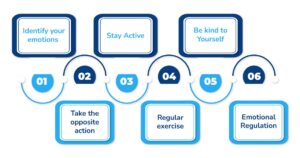Emotional dysregulation in relationships makes it hard for both partners to function well together. Poor emotion regulation causes people to overreact and respond unpredictably, which blocks you from maintaining steady emotional relationships. Moreover, your partner always remains on guard to avoid setting off emotional explosions. This problem damages trust, emotional bonds, and communication between partners.
When emotional episodes happen, the emotional partner suffers from self-blame, yet their partner feels emotionally empty and unable to help. Read on to learn more about the symptoms, causes, and treatment options for emotional dysregulation disorder.
What Is Emotional Dysregulation?
A mental health symptom called emotional dysregulation makes it hard for you to handle your emotions and the way you react to them. People around you might find your emotional responses don’t match the triggers and issues. In addition, when you handle your feelings, you get to pick what you feel and how you react. Your brain has trouble handling and controlling your emotions properly. The natural process of managing emotions becomes difficult for your brain, so you experience stronger feelings that resist your control.
Are you still feeling emotions about little things, but can you control them? If so, no worries! You can contact us at MAVA Behavioral Health for better assistance!
Emotional Dysregulation Symptoms
Here are the signs of emotional dysregulation disorder that include:
- Severe depression
- High-risk sexual behaviors
- Extreme perfectionism
- Conflict in interpersonal relationships
- Anxiety
- High levels of shame and anger
- Self-harm
- Eating disorder
Emotional Dysregulation Causes
Most people who struggle with emotional stress usually suffer from multiple disorders that cause problems with their feelings. Dysregulation of emotions is most common in these groups of people:
- These conditions regularly modify their moods, personality, and self-regulation skills.
- Part of the brain gets harmed.
- Stress that lasts for a long time makes it difficult to control our feelings.
- Our emotional reactions can change after we go through traumatic life events.
- Children’s brains are growing and changing; they struggle more with managing their feelings.
- When our body’s hormones change, our moods and feelings change.
Emotional Dysregulation Examples
Here are some of the examples of the dysregulations in the emotions:
- Mood swings
- Depression
- Emotion suppression
- Angry outbursts
- Self-harm
- Anxiety
Emotional Dysregulation in Relationships
When emotions become too intense, people struggle to handle them correctly, causing sudden reactions that trigger conflicts in their relationships. When this happens, people often pull away from each other, which leads to more problems that don’t get solved.
Similarly, when looking at emotional changes, we usually find the source of these changes in children’s early life experiences. Our emotional growth depends heavily on how well we form bonds with the people who care for us in early life. Having a secure attachment with caregivers helps us develop good ways to deal with our emotions. Later on, it may also lead to emotional dysregulation in children. Likewise, when parents are unreliable with care, the child’s ability to manage emotions gets disrupted. Not developing healthy ways to deal with emotions can cause these problems to last into relationships we have as adults.
Trauma and Emotional Dysregulation
Experiencing trauma tends to make it harder for people to handle their emotional responses. It weakens the brain’s system for handling powerful feelings. When trauma happens, some people become extra sensitive to threats, get upset easily, and have very powerful emotional responses.
In addition, your reactions to trauma can make it hard for them to build and keep good relationships. On top of that, when trauma goes unresolved, people notice threats and rejections more easily. When trauma happens repeatedly, it changes how the brain handles emotional triggers, creating an endless loop of emotional problems and stress.
By contrast, people can recover when they learn and deal with trauma practices, including mindfulness and grounding. When we can manage our feelings better, we become better at spotting warning signs.
Emotional Regulation Vs. Insecure Attackers
Emotional Regulation | Insecure Attackers |
| The ability to control to react to emotions in a healthy and adaptable manner. | Individuals who react defensively or aggressively due to feelings of insecurity. |
| Calm, thoughtful responses to emotional triggers. | Impulsive, defensive, or hostile reactions. |
| Recognizes and understands emotions before responding. | Struggles to identify or understand their own emotions, leading to reactive behavior. |
| Seeks to resolve conflicts constructively and empathetically. | Escalates conflicts or uses aggression to protect their self-image. |
| Self-awareness and coping strategies. | Triggers are often external judgments, criticism, or rejection. |
What Does Emotional Dysregulation Look Like?
People who cannot manage their emotions tend to have problems connecting with others and expressing their feelings. Strong emotions can cause people to lose control and take their anger out on a close friend, making them feel guilty immediately afterward.
Moreover, people with emotional dysregulation often have trouble naming or showing their feelings properly, and they react when others reject them.
You can solve problems, resulting in conflicts and making people feel alone or guilty. Hence, you need to reach out for assistance to build new, effective strategies to manage your feelings.
Tips For Overcoming the Emotional Dysregulation

Controlling how you feel helps you build better relationships, succeed at work, and live happier. New research finds that when you can manage your emotions well, you’re less likely to suffer from depression and health problems.
You may develop your emotion management abilities in a variety of ways, including:
1. Identify your emotions
Identify your emotions using specific words to maintain awareness. “I am both hurt and confused because you chose to act this way toward me.” When we can name our feelings, we have more control over them.
2. Take the opposite action.
In DBT, you’re asked to behave contrary to how you’re feeling at the moment. Feeling anxious? Act confident. Full of fear? Act brave. When you act against your emotions, you learn that your feelings are temporary and that you decide how to handle them yourself.
3. Stay Active
You probably know the saying: “Choose to respond thoughtfully rather than just react impulsively.” This helpful suggestion teaches you ways to control your feelings. We feel our worst when we automatically respond to situations instead of taking time to think about our actions. When you notice what’s going on in your mind and body, you can better handle situations.
4. Regular exercise
Strong feelings make us feel like energy is rushing through our bodies. A good way to deal with excessive anxiety and anger is to use exercise as a channel to burn off that extra energy. You’ll like.
5. Be kind to Yourself
Speak kindly to yourself, just as you speak kindly to others around you. Remember that emotional challenges are a common part of the human experience, reaching all of us at different times.
6. Emotional Regulation
You can improve how you handle your emotions with the help of a therapist who shows you ways to express and control your feelings. A mental health expert combines different approaches to help you develop better ways to control and stabilize your emotions.
Emotional Dysregulation Treatment
People with emotional dysregulation disorder can learn effective ways to control their emotional responses. Certain treatments help people handle this process better. Addressing conditions that affect how the brain works differently yields the best treatment results.
1. Medications
Medications help you control your emotions better. The effects of medication depend on many things including the drug type and what disease it targets.
2. Supportive Care
The goal is to find and address what creates emotional problems or triggers their symptoms. Direct symptom management for concussion patients helps them recover more quickly. You cannot directly treat the concussion itself. Your emotional control problems might resolve themselves as your brain heals from the concussion unless these symptoms were present before your injury.
Important Note:
All the details provided in this article aim for informational and educational purposes. Please don’t consider it medical advice or a substitute for a psychiatric evaluation. For professional guidance and treatment, consult with our licensed healthcare professionals at MAVA Behavioral Health.
Final Note on Emotional Dysfunction
Strong feelings become part of everyone’s life experience. Your emotions can become unhealthy when you struggle to control them. People from all walks of life experience emotional dysregulation disorder, which commonly emerges with BPD, bipolar disorder, or ADHD. So, people with these symptoms show rapid mood changes plus impulsive behavior and self-injury. You’re not alone in this.
Get professional mental health guidance to discover suitable treatments. Starting treatment can help you gain faster control of your emotions. To get behavioral health support, contact MAVA Behavioral Health. Our expert mental health professionals are here to treat your issue in a nonjudgmental environment. You can also choose your preferred option, whether telehealth sessions or in-clinic visits. Hence, contact us today!
FAQ’s
What are the long-term effects of emotional dysregulation?
The ongoing impact of emotional dysregulation destroys our professional life and personal connections while reducing our self-confidence, which prevents us from building stable relationships and reaching our objectives. The absence of dealing with emotional regulation problems can cause prolonged stress and anxiety disorders, which often produce depressive feelings.
How to support someone who is emotionally dysregulated?
Keep your emotions under control to show an understanding of their emotions from an unbiased viewpoint. Give your full attention by letting them speak and telling them that many people deal with similar problems. When necessary, guide your friend to professional help while keeping professional boundaries to keep them emotionally safe.
How does emotional dysregulation affect someone?
People who struggle with dysregulation by emotions that produce quick shifts in mood. It increases their struggle to function in everyday life. People with emotional imbalance or dysregulation tend to overreact to stress while finding it hard to control their emotions and keep relationships and work tasks steady.
How to respond to someone who is emotionally dysregulated?
Stay calm and composed. Keep your voice steady and maintain a relaxed posture. Your calmness can help you to feel more grounded.









